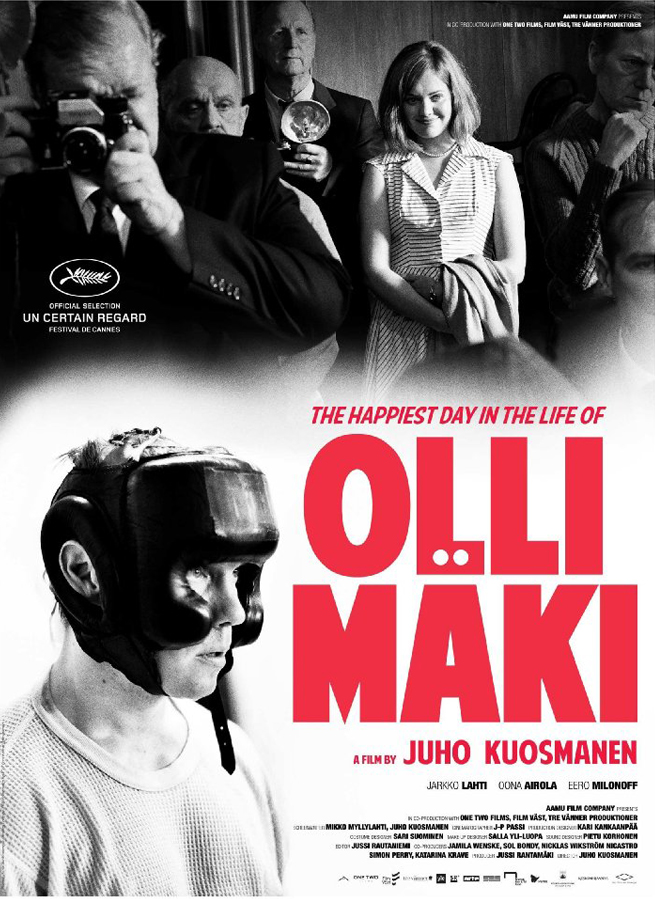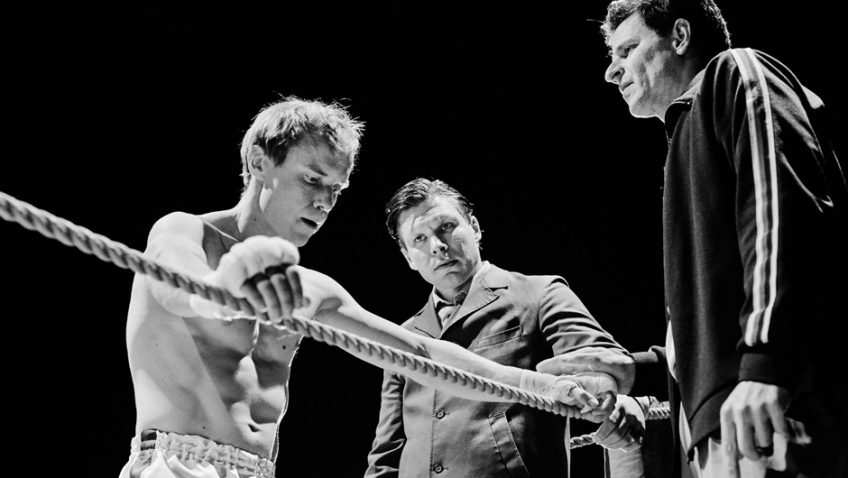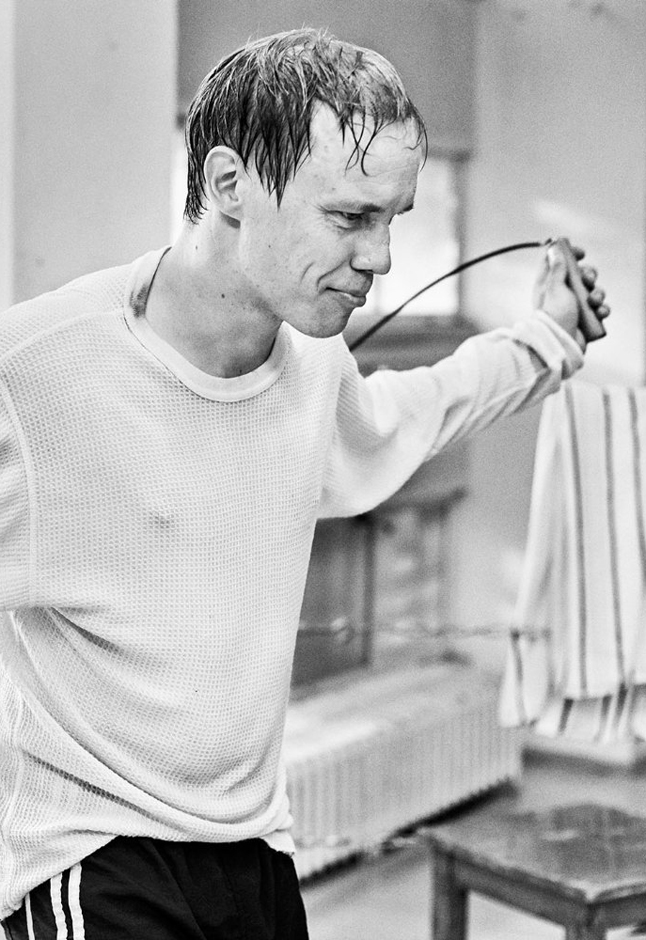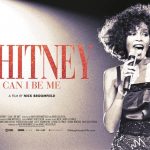Joyce Glasser reviews The Happiest Day in the Life of Olli Mäki (April 21, 2017)
Most boxing movies originate in the USA. When a movie about a boxer’s big fight wins the prestigious Un Certain Regard award at the Cannes Film Festival (2006), our thoughts wander back to Raging Bull, Rocky or to some story where an American boxer suffers a life- changing set-back, renounces women, food and booze, and stages a triumphant come back. While that is the format of most boxing films, first time feature co-writer/director Juho Kuosmanen has a surprise in store with The Happiest Day in the Life of Olli Mäki, a boxing biopic that he tells with a touch of the famous Finnish deadpan.
 The film is, in a way, a love triangle. On the one hand, there is Olli Mäki’s (look-alike actor Jarkko Lahti) love of boxing and his friendship with his hard-working manager Elis Ask (Eero Milonoff). Elis, with financial problems of his own and four kids to feed, has been busy persuading sceptical financiers to back Olli. He has also just negotiated a once-in-a-lifetime opportunity for the amateur-turned-pro boxer to add a World Boxing Association featherweight championship title to his modest CV.
The film is, in a way, a love triangle. On the one hand, there is Olli Mäki’s (look-alike actor Jarkko Lahti) love of boxing and his friendship with his hard-working manager Elis Ask (Eero Milonoff). Elis, with financial problems of his own and four kids to feed, has been busy persuading sceptical financiers to back Olli. He has also just negotiated a once-in-a-lifetime opportunity for the amateur-turned-pro boxer to add a World Boxing Association featherweight championship title to his modest CV.
Elis has performed miracles in staging a 15-round home match in Helsinki against American boxer Davey Moore (John Bosco Jr). This would be one of the biggest boxing events in Finnish history and the pressure is on Olli to carry the hopes of the nation. The pressure is also on his diet. Olli’s fondness for buttered bread with lunch worries Elias as Olli has only a few days to slim down from 60 to 57 kilograms.
On the other hand, there is the country life of Kokkola where Olli was a baker before turning pro and where his heart lies. For Olli has just fallen in love with Raija (Oona Airola): a pretty, fun-loving, easy-going friend who is clearly Olli’s soul mate. When the film begins the two are going to a wedding (that Olli has forgotten about). During the ceremony, the male guests start questioning Olli on weight classifications (he is uncomfortable with the featherweight requirement) until they are hushed up by an indignant older woman. The wedding scenes also show that Olli loves children and is happier out of the limelight and away from the crowds.
Olli invites Raija to accompany him to training in Helsinki where the couple stay in the Ask family’s cramped apartment – sleeping on their children’s bunk beds while the unhappy kids are displaced. Throughout her stay in Helsinki Raija never complains. She maintains her beautiful smile, stays out of the way and quietly takes the train home when she feels her presence is distracting Olli.
But while Olli trains hard and finally sets about losing the weight, he does complain and is depressed without Raija. He just about puts up with a documentary film crew hired to do a profile of the preparations and compliantly stands on a box to pose with a much taller model. He shows up for awkward meetings with his backers but fails to inspire them with the confidence Elis is hoping for.
With just two days remaining before the fight of his life, Olli is thinking of Raija…
Kuosmanen wants to transport us back to another world, not only rural Finland, but 1962, when there were no mobile phones which might have changed the course of many true stories and films. To do this he not only shot on location, but to achieve a vintage effect, used 16mm Kodak Tri-X black and white film stock, a stock that produces a grainy effect and is not usually used for feature films. It works well here, suggesting a documentary, and providing a dated, unaffected, natural look, echoing the characters themselves.
Kuosmanen’s injection of deadpan humour is engaging, and he keeps a light touch throughout, although some viewers might not find Olli’s priorities all that amusing. Elis, who was himself a boxer, and whom we hear arguing with his wife about finances, has gone out on a limb for Olli. While Kuosmanen wants to reflect Olli’s rejection of the trappings of success and the commercialisation of sport, his revolt is not heroic or even admirable. It is, rather, inexcusably inopportune.
Moreover, Olli was not born yesterday: he knows what would be expected of him, knows of Elis’s sacrifices and potential loss of credibility vis-à-vis the sponsors; and he knows that he is a role model whose future (he is clearly no intellect) could be determined by this fight. All fighters are nervous before a fight, but Olli seems curiously ungrateful and immature. If we are meant to overlook this irresponsibility in the name of love, it is not easily done. Raija is not going anywhere.
The love story, however, is faultlessly told. There is a real chemistry between Lahti and Airola who is particularly compelling. He might be the professional athlete, but it is Raija who revels in wild swimming while Olli sits on the rocks and watches. Easy to get along with, and fun to be with, you can see why Olli would enjoy Raija’s company and miss her when she is away, as she lights up the screen. There is a particularly touching note at the end when Raija and Olli walk past an elderly couple who are holding hands. Raija turns to Olli and asks, ‘Do you think we’re gonna look like that when we get old?’
That question was asked in 1962. Olli Mäki is now 80. The elderly, loving couple in the final scene are none other than the real Raija and Olli Mäki, so we, at least, have the answer.
You can watch the film trailer here:





